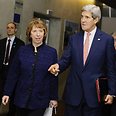
Iran nuclear talks enter crucial third day
Entering third day of nuclear talks, powers decide to allow EU's Ashton to meet Iranian FM without other powers in bid to overcome negotiation's main obstacles – uranium enrichment, relief for Iran's oil, bank sectors
Two top diplomats are back at the negotiating table in Geneva, trying to hammer out terms that would start curbing Iran's nuclear program in exchange for sanctions relief for the Islamic republic.
Talks between Iran and the major powers made progress but there are still "sticking points" that need to be worked out, Iranian negotiators said Friday, the third day of negotiations in Geneva.
Related stories:
- US poll: Majority support deal with Iran, oppose attack
- PM: I pledge Iran will not get nuclear weapon
- Op-ed: Persona non grata
"Differences of opinion remain and we are negotiating over them. God willing we will reach a result," Foreign Minister Mohammad Javad Zarif said in statements carried by Iranian media, after an one-hour meeting with EU foreign policy chief Catherine Ashton.
The nuclear talks being held formally group six world powers with Iran, but the seven nations have convened only once since the current round of talks started Wednesday. Instead, Iranian Foreign Minister Zarif and top EU diplomat ne Ashton have met instead to try to find common language on a first-step deal. The two resumed their talks Friday.
Deputy Foreign Minister Majid Takht-e Ravanchi, who also attended the meeting, added: "We felt there was progress in the talks today" with the six world powers.
Abbas Araqchi, a deputy foreign minister, referred to "minimal progress" despite "serious commitment" from both sides.
Among the apparent sticking points are Iran's uranium enrichment program – which can produce both reactor fuel and the fissile core of nuclear warheads – and relief for Iran's oil and banking sectors.
This third and crucial meeting since President Hassan Rohani was elected in June is seen as the biggest hope in years to resolve the decade-old standoff over Iran's nuclear program.
Clinching a deal palatable to skeptical hardliners both in the United States and in the Islamic republic – as well as Israel – has proven a daunting task, however.
Failure might mean Iran resuming the expansion of its atomic activities, Washington and others adding to already painful sanctions, and possible Israeli military action.
According to a draft proposal hammered out on November 9, the United States, Britain, China, France, Russia, and Germany – the P5+1 – want Iran to freeze for six months key parts of its nuclear program.
In return Iran would get minor and, Western officials insist, "reversible" sanctions relief.
This hoped-for "first phase" deal would build trust and ease tensions while Iran and the six powers hammer out a final accord that ends once and for all fears that Tehran will get an atomic bomb.
"A first step is a very, very important deal because it means that a deal has been struck, which changes the atmosphere, changes the conversation," said Trita Parsi, author and president of the National Iranian American Council.
Friday's third day of talks, which resumed at 0800 GMT with a meeting between the powers' chief negotiator Catherine Ashton and Iran's foreign minister, "could be decisive," a European source said.
It was unclear how long they would last, possibly extending into the weekend, or whether rumors were true that foreign ministers would fly in as they did at the last round two weeks ago.
This has not been confirmed and indeed Iran's chief negotiator Abbas Araqchi said on Thursday that there had been "no progress" so far, and no deal in sight yet.
But the P5+1 have been somewhat more upbeat.
Ashton's spokesman said that her four and half hours of talks on Thursday with goatee-bearded Foreign Minister Mohammad Javad Zarif were "very good".
"It has been very intense, very substantial, very detailed," Michael Mann said, saying such a landmark deal is "not something you can just agree like that."
"We are making progress. There are fewer points in brackets" in the draft agreement, the European source said. "But obviously the remaining issues are the hardest ones."
Many in Israel, widely assumed to have a formidable nuclear arsenal itself, are alarmed, however, with Prime Minister Benjamin Netanyahu campaigning vigorously against the mooted deal.
Netanyahu wants all of Iran's nuclear infrastructure dismantled, not parts of it frozen, believing that the P5+1 will leave Iran with an ability to develop nuclear weapons.
"You are not really dismantling any capacity to make fissile material for nuclear weapons," he said in an interview in Germany's Bild, Europe's top-selling newspaper, this week.
In the United States meanwhile there is a push by lawmakers to ignore President Barack Obama's pleas and pass yet more sanctions on Iran if there is no deal - or one seen as too soft.
Raising the pressure, US Senate Majority Leader Harry Reid said in Washington on Thursday that lawmakers would move to impose new trade restrictions in December.
This risks spoiling Iran's apparent newfound appetite for rapprochement with the West since Rohani replaced the more hardline and combative Mahmoud Ahmadinejad in August.
Rohani is under pressure to show the supreme leader Ayatollah Ali Khamenei the first fruits of his "charm offensive", and it is unclear whether the minor sanctions relief on offer is enough.
Khamenei, describing Israel as a doomed "rabid dog", said in Iran on Wednesday on the first day of the talks that he insisted "on not retreating one step from the rights of the Iranian nation".
By this he meant what he sees as the "right" to enrich uranium, something the P5+1 are loath to endorse explicitly and which is a key sticking point in Geneva. "The principle of enrichment is not something that is negotiable," Araqchi said Wednesday. "But we can talk about volumes, the level and the location."
- Receive Ynetnews updates directly to your desktop










